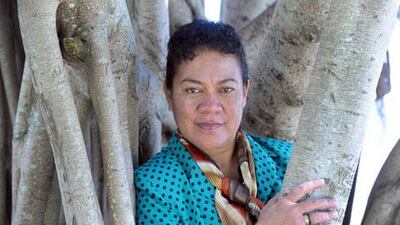CAIRNS, AUSTRALIA // The World Bank has outlined its vision for economic survival in impoverished parts of the South Pacific, with more islanders being encouraged to head overseas to work in wealthier countries. The bank believes increased emigration and remittances from a growing army of expatriates could be part of a solution to chronic disadvantage in the region, where charities estimate that one person in three lives in poverty. Prosperity has been elusive in many remote "sea-locked" states, from Kiribati to Palau, one of the most aid-dependent communities on Earth. "These small and scattered islands have low economic density and small markets," said a World Bank report released earlier this month at a regional summit in the tropical Australian city of Cairns. "Children in island families receiving remittances from migrant family members show strong improvements in education and health outcomes, suggesting that enhanced labour mobility could be a powerful driver for longer-term welfare in these countries." Australia has supported the bank's plans to assist some of the most isolated places in the world. "People often fail to understand the depth of the challenges which the governments of many of the Pacific Island countries face when you look at the ... location and the scale of the operation they have to do in providing basic services to a very dispersed population across great distances with few resources," said Bob McMullan, Australia's parliamentary secretary for international development assistance. Historically, legions of islanders have migrated to Australia and New Zealand, while 40 per cent of Tuvaluan men work as merchant sailors for foreign shipping companies. The prospects of accelerating the exodus have, however, been jeopardised by the global economic meltdown. It has caused mounting unemployment in developed nations, where many migrant workers have lost their jobs. "For countries like Samoa and Tonga, which have a lot of people working overseas, remittances are the major vulnerability for them and that income is already falling," explained Barry Coates, the executive director of Oxfam New Zealand, who greeted the World Bank's labour mobility proposal with scepticism. "It is not a good development model to have to send your people abroad and what it does sometimes cause is social problems where families are left without their breadwinner.
"Yes, they bring back money but in many other ways the family comes under strain, particularly women while the men are away working," he said. "Real development work really needs to be undertaken so that societies can themselves develop a viable economy without having to hop on an aeroplane and go to another country," Mr Coates added. The international financial crash has severely dented tourism in the South Pacific and, while levels of foreign aid have survived the crisis largely unscathed, export prices have fallen and the cost of fuel and food have risen sharply. In Kiribati, a former British colony comprising 33 coral atolls that span the Equator in between Australia and Hawaii, the problems are intensifying. "We have a lot of people in Kiribati who are unemployed. We do not have enough jobs for everybody," said Pelenise Alofa Pilitati, a businesswoman, during a visit to Cairns to add her voice to discussions at the Pacific Islands Forum. "Life has always been a struggle and they have always managed because that is the Pacific way. We are not really controlled by money. Every day is about survival," she said. Kiribati, with a population of about 112,000, is one of the least developed states in the South Pacific, where a lack of education and training has inhibited the growth of an isolated economy that relies heavily on exports of fish and copra. Mrs Pilitati believes it's time for her people to take control of their one great resource: the sea. "If Kiribati is really going to be strong economically, they shouldn't be afraid to go into business especially using the ocean that we have. We are not using it wisely. We are letting people come to fish in our waters. "Fish is a natural resource but the overseas companies come and take our fish and we are left with very little," she stated. As poor communities fight to survive, economic necessity has increasingly delivered telling blows to the environment, which has been degraded by extensive land-clearing, mining and overfishing. Australia's national science agency, the CSIRO, has been working in pristine areas of Papua New Guinea and the Solomon Islands to promote sustainable living through, for example, ecotourism and biodiversity payments, where large corporations or foreign governments compensate islanders to preserve fragile coral reefs and rainforests. "What we have to demonstrate is that economic development and conservation can go hand-in-hand," explained Dr James Butler, a CSIRO researcher in Cairns. "The will is there and the necessity is there too. So, people have been driven to think about these alternatives. Unfortunately short-term, quick fix options are often much easier to pursue. "Consequently a mining enterprise might seem a lot more appealing to locals on the ground and governments than putting more effort in to something more sustainable that perhaps takes longer to establish," he said. pmercer@thenational.ae

